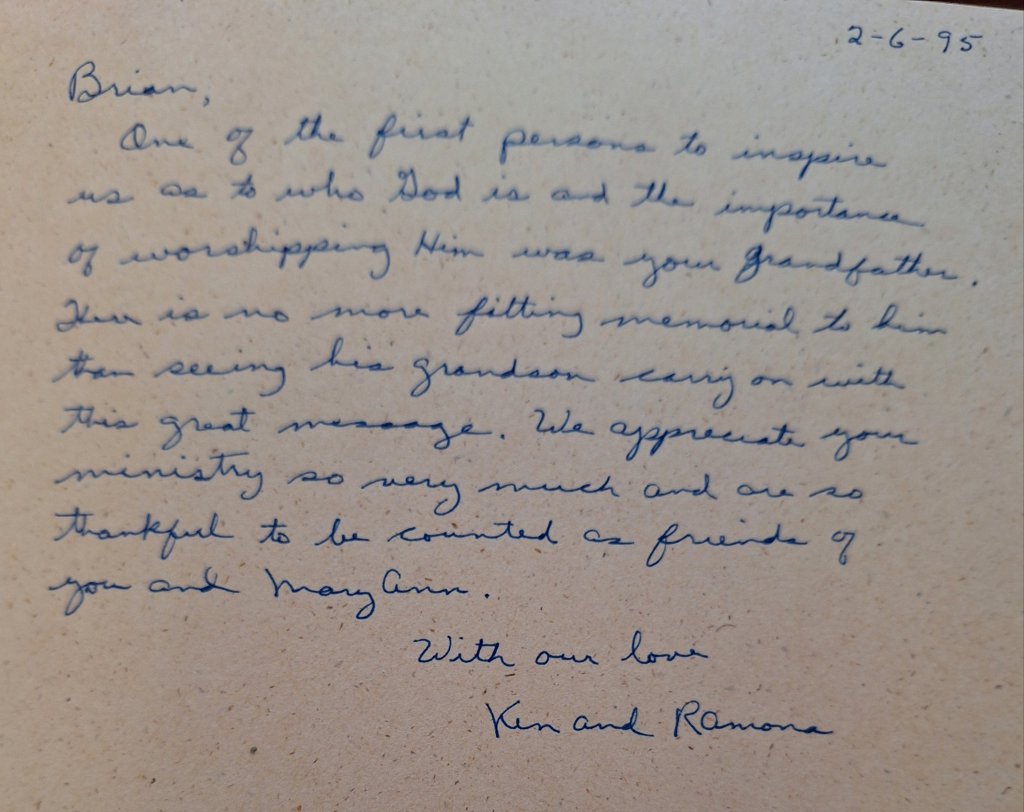In recognition of tradition, mothers, familial relationships, and hymns, I am sharing below a short section written more than 60 years ago by the late Kay Moser. His book Thorn in the Flesh was a kind of fictional biography.¹ In this passage, two young college students at Harding are enjoying each other’s company and reminiscing.
“I wonder who ever thought about writing a song about Mary Ann playing in the sand by the seaside?” Bill diverted, after she didn’t speak for a while.
“I’m quite certain I don’t know. The ‘Banana Boat Song’ isn’t much better when making sense is considered. I like to hear them, though, don’t you?”
“I like ‘My God and I’ better. That is a different world, though, I guess.”
“I, too. That is the most beautiful song I ever heard. It seems to purify you inside. I have heard so many students at Harding say it was their favorite. It’s almost a symbol of Harding to me.”
“I like that narration by Brother Richland,” Bill said, reminiscing, “especially when we were all around the Lily Pool. Those hymns being sung in the lunch line and around the Lily pool was one of the most impressive things of the year, I think.”
– W. Kay Moser, Thorn in the Flesh, pp. 73-74
I share this beautiful vignette from Harding’s halcyon days on the day that would have been the birthday of a dear longtime family friend, Todd Thompson. Almost a year ago, Todd passed away unexpectedly while completing outside tasks at home. He left behind a loving wife and four children, and also a mother and a sister, with her family.
Todd was a lifelong friend. He knew my family, and I, his. His sister is married to one of my cousins. I count his cousins as FB friends and would recognize them anywhere. Todd’s mother, with whom I’m still in touch, loved my family and would have experienced “My God and I” at Harding Lily Pool devotionals like the one Moser referred to in his book. Like his dad and mom, Todd had a beautiful voice and spirit.

The “Brother Richland” in the above passage is unmistakably my grandfather, Andy T. Ritchie, Jr. At this juncture in my life, such memories—even those experienced vicariously such as the Lily Pool devotionals—draw my heart. Nothing in my life has arisen to serve a similar purpose recently. Those in our circles would go to some lengths to sing together. Here, I think first of the New Hardels²—an octet that comprised the Thompsons, Smiths, Hladkys, and Caseys. The group loved each other deeply and sang together often. Rehearsal times in all the families’ homes were filled not only with music but with laughter and God-oriented conversations. For select wedding and funerals, that group was sometimes augmented by Duzans, Barkers, Harrills, and others. By extension, experiences at Camp Manatawny (the above pic is of the 2nd generation New Hardels male quartet at Camp) and, later, with the Lights group come into my memory. In more recent years, we have sung in three Smith living rooms. Often, Tanya (the eldest child of the group) will speak of the rich heritage of Christian singing that we shared. “We didn’t know what we had then,” she will say. And she is right. But now we know. And we miss it.

Now, about the place of hymns. First off: I like some jazz and fusion jazz, some older pop-rock sounds, I don’t gravitate to choral music, but I listen to classic/progressive rock fairly often, along with a more dietary standard of all-instrumental art music (chamber, wind, orchestral, piano, etc.). Once in a while, musical humor such as PDQ Bach or even Homer & Jethro is cool, but few of my choices are sort of “Sally by the seashore” songs, in comparison to the “My God and I” ilk. If I had to choose, the Lily Pool beats the Banana Boat hands down.
Todd, your funny bone seemed a lot like your mom’s. Silly was a good thing sometimes, and I feel sure you would have laughed together about “Banana Boat” songs. But I believe you are having “My God and I” and Lily Pool experiences now, like never before. You might well be smiling, or gasping in awe, and I envy you. On this Mother’s Day, also your birthday, I honor you, your dear mom, our families, and good things such as worshipful singing.
I am setting this to post at approximately the time I’ll be playing the principal horn part on Percy Grainger’s mother-honoring Colonial Song in the Pinnacle Winds concert in KC. I wish my own mom, now gone from this life for almost two years, could be present physically, but I think she would like this content of this blogpost—including the family connections and the thought of singing hymns together—even better than the concert.

¹ About Kay Moser: I actually believe this book is autobiographical, but I’m not certain. William Kay Moser, I think, was the “Bill” in the book.
I spent a little time with Kay and Annabelle Moser eight years ago. The two had some fascinating life experiences, and I was so pleased to interview them, chiefly about having Kay’s having been jailed for being a Conscientious Objector. That believe constitutes a relational point of connection with me and some of my family. There is a transcript of the bulk of the interview in my book Subjects of the Kingdom. That chapter is actually reproduced on my other blog, here.
² The group took its name from New Jersey, Harding, and Delaware.











